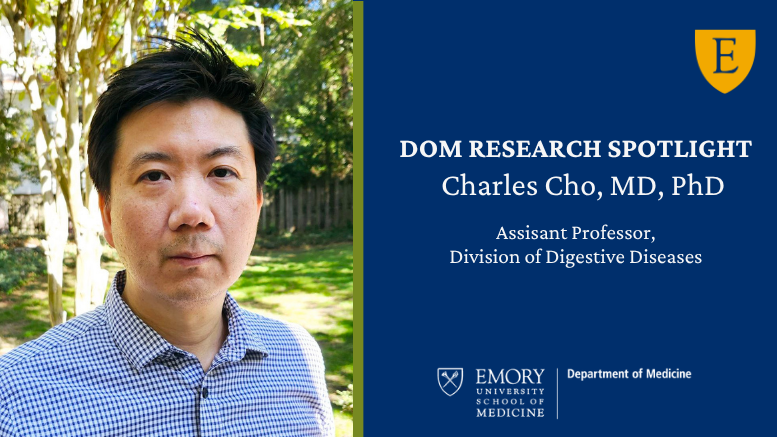This edition’s Researcher Spotlight features Charles Cho, MD, PhD, Assistant Professor in the Division of Digestive Diseases. Learn more about our colleague below!
What is your professional background?
I was initially trained as a clinician in Korea throughout my 20s and into my mid-30s. I completed six years of medical school, followed by an internship, an internal medicine residency, and a two-year gastroenterology fellowship. Toward the end of my clinical fellowship, I had the opportunity to visit Dr. Jason Mills’ lab at Washington University in St. Louis, which ultimately led me to change my career path.
After completing my PhD in Korea, I joined Dr. Mills’ lab in 2018 as a postdoctoral researcher and NIH T-32 training grant recipient, where I studied secretory cell physiology in the stomach and pancreas, as well as the role of these cells in tissue regeneration after injury—a process known as paligenosis. I later continued this research as an instructor at Baylor College of Medicine, shifting my focus toward the ribosome and translation aspects of the process.
Which division do you work in, and who is your mentor?
I joined Emory as an assistant professor last October in the Division of Digestive Diseases, and my lab and office are located in the Whitehead Research Building. Shanthi Srinivasan, MD, our division director and my mentor, has been instrumental in helping me settle in, along with other mentors across the campus. I would also like to thank Greg Lesinsk, MD, for introducing me to the GI oncology group and helping me access additional resources.
Briefly describe your research. Why is it important?
My current research focuses on two main themes. The first is metaplasia in the pancreas. Acinar cells in the pancreas are enzyme-secreting cells that can acquire ductal characteristics upon injury, a process known as acinar-to-ductal metaplasia (ADM). This phenomenon is clinically relevant, as chronic pancreatitis, one of the major risk factors for pancreatic ductal adenocarcinoma (PDAC), is associated with ADM. Despite its name, PDAC is not solely derived from ductal cells; lineage-tracing models have shown that acinar cells, through metaplastic events such as ADM and subsequent pancreatic intraepithelial neoplasia (PanIN) formation, also contribute to PDAC development. Using mouse models and ex vivo culture systems, I aim to uncover the mechanisms underlying this metaplastic/tumorigenic process and explore how these findings can be translated into clinically useful strategies for the early detection and prevention of PDAC.
The second project I am working on involves mRNA translation regulation in vivo, and the role of ribosome-binding factors in controlling translation and ribosome stability. Specifically, I am investigating global translational changes (e.g., global translational block) as well as specific transcripts preferentially translated in response to injury, which can be analyzed using established methods such as ribosome profiling. Additionally, I am interested in proteins that bind to ribosomes and affect translation, particularly those that plug ribosomes under injury conditions—a process that appears to be evolutionarily conserved (e.g., mammalian orthologs of Stm1 in yeast).
What do you like most about Emory?
What I like most are the collegiality, the collaborative atmosphere, and the diversity of topics that can be explored at a university, with the beautiful campus as an added perk.
How do you spend your free time?
I have three kids and am still settling into the neighborhood, so I don’t feel like I have much free time. But when I do, I try to head to the North Georgia mountains for a hike. It’s awesome having nature so close—just an hour and a half away.
What is your favorite movie or TV show?
I tend to watch whatever keeps me on the treadmill, but I recently enjoyed “Zero Day”, and “American Primeval” was also good.
What is a fun fact about you?
I’m not as into it these days, but I used to be crazy about fossils—Kemmerer, WY, is one of my favorite places. Someday, I hope to find opportunities to study the evolutionary aspects of the GI tract using them.


Be the first to comment on "DOM Research Spotlight: Charles Cho, MD, PhD | Division of Digestive Diseases"